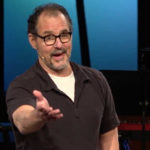We run our website the way we wished the whole internet worked: we provide high quality original content with no ads. We are funded solely by your direct support. Please consider supporting this project.

A Cruciform Dialectic
One of the most important aspects of God’s action on Calvary, I believe, is this: God revealed himself not just by acting toward humans, but by allowing himself to be acted on by humans as well as the fallen Powers. God certainly took the initiative in devising the plan of salvation that included the Son of God becoming human at “the right time” for him to get crucified (Rom 5:6). And God was certainly taking the initiative as Jesus taught and acted in provocative ways that were certain to get him crucified. Hence, Scripture says that part of God’s “deliberate plan and foreknowledge” was to have Jesus handed over (Acts 2:23) to wicked people to do what God’s “power and will had decided beforehand” should be done (Ac 4:28).
At the same time, as active as God was in revealing his nature on Calvary, we must also notice that this revelatory act took place by God allowing wicked humans and forces of evil to act out their wicked and violent intentions against Jesus. Indeed, the physical and verbal assaults Jesus absorbed in the process of being crucified were actually just a microcosm of the sin of the world that Jesus absorbed on the cross, thereby allowing every human throughout history to act on him.
It is within this dialectic of acting and being acted upon that God communicates his true identity, and given that his true identity is humble, self-sacrificial love, it’s hard to see how it could have been otherwise. A deity whose essence was power could reveal himself by unilaterally acting upon others, but not the one true triune God whose eternal existence is an unending act of three divine Persons giving themselves wholly over to one another.
As the biblical narrative attests, and as Calvary makes most explicit, God is a God who humbly makes space for agents whom he has created to possess a degree of autonomous “say-so” in effecting what comes to pass—even to the point that their “say-so” influences, and in limited ways, thwarts, God’s “say-so.” Hence, God’s typical way of working in and through human agents is by means of influence, not coercion. God respects the relative autonomy, personhood and free will of people, to say nothing of angels. And this is, at least in part, why his way of rescuing us from the prison we have placed ourselves in is a slow, gradual, arduous process that involves a great deal of patience and self-sacrifice on God’s part. For the same reason, it is a process that involves God relying on his wisdom rather than merely relying on his power to accomplish his purpose, as the quintessential revelation of God on Calvary makes clear and as Scripture repeatedly stresses.
The cross is thus the full revelation of God’s character precisely because it wasn’t a unilateral action of God toward humans but rather came about, in part, by God humbly allowing human and angelic agents to engage in hostile activity against God. For this same reason, the cross was not merely a revelation of God’s power but also of God’s wisdom. God wisely turned the evil he absorbed into good, including the good of glorifying his Father by revealing his true self-sacrificial character and freeing humans from their oppression to sin and the devil.
Photo via Visual Hunt
Category: General
Tags: Character of God, Cross, Cruciform Theology, Love
Topics: Attributes and Character
Related Reading

God Does Not Always Get What He Wants
One of the ways the Bible makes it clear that humans have free will and that God doesn’t predetermine human decisions is found in the responses God has toward human choices. Scripture consistently depicts God as being frustrated by the way his people obstinately resist his plans and Scripture often depicts God’s heart as breaking…

Podcast: Greg Introduces His Cruciform Hermeneutic at the CrossVision Conference and Dialogues with Rachel Held Evans
Greg Introduces His Cruciform Hermeneutic at the CrossVision Conference and Dialogues with Rachel Held Evans. http://traffic.libsyn.com/askgregboyd/Episode_0240.mp3

Sin-Bearing God
On the cross, God became our sin, as Paul wrote: “God made him who had no sin to be sin for us” (2 Cor 5:21). However, God didn’t begin to be a sin-bearing God when Jesus walked the earth and hung on the cross. Rather he became Incarnate and bore our sins on the cross…

How to Interpret the Law of the Old Testament
While there are multitudes of passages in the OT that reflect an awareness that people are too sinful to be rightly related to God on the basis of the law, there is a strand that runs throughout the OT that depicts Yahweh as “law-oriented.” This label is warranted, I believe, in light of the fact…

Podcast: Does the Cruciform Hermeneutic Sabotage Open Theism?
Greg plays Peek-a-Boo with God and considers whether those verses Open Theists use to support Open Theism might simply be times when God is accommodating for us. http://traffic.libsyn.com/askgregboyd/Episode_0236.mp3

Getting Honest about the Dark Side of the Bible
Eddy Van 3000 via Compfight While most of the Bible exhibits a “God-breathed” quality, reflecting a magnificently beautiful God that is consistent with God’s definitive revelation on the cross, we must honestly acknowledge that some depictions of God in Scripture are simply horrific. They are included in what is sometimes called “the dark side of…
